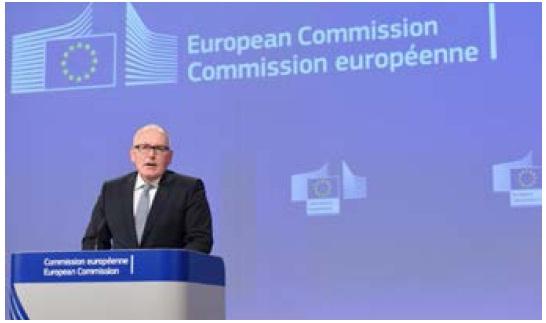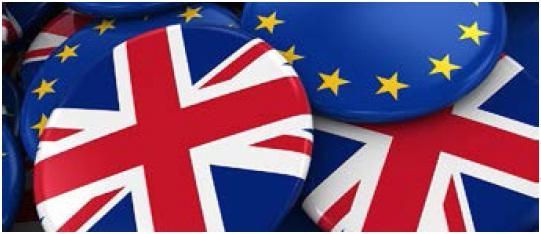The European Commission launched a formal dialogue with Warsaw on 13 January because of what is happening around the Polish Constitutional Court and the amendment of the media law.
First Vice-President Frans Timmermans received a mandate at the meeting of the the College of Commissioner to send a letter to the Polish government.
Brussels should clarify what it is concerned about regarding the developments in Poland; Warsaw in turn should provide evidence that there are no violations of the principles of rule of law in the country.
Such a dialogue is the preliminary phase of the so-called Rule of Law Framework created by the Commission in 2014.
According to Timmermans the entire College agreed on the procedure, which means that the decision also had to be supported by the Commissioner for the Internal Market, Industry, Entrepreneurship and SMEs Elżbieta Bieńkowska, who the previous Polish government nominated to the Commission.
If both parties fail to reach an amicable solution, the Commission can send Warsaw a more formal opinion. If it does not receive a satisfactory answer, in the second phase it can issue recommendations on the basis of which the Polish government would have until a certain date to solve the problem which Brussels had drawn attention to.
If it did not remedy the problem, the Commission can propose activation of Article 7 of the Treaty of Lisbon. This could ultimately lead to restrictions on Polish voting rights in the EU Council. The procedure, however, must be carried out in cooperation with other member states and the European Parliament.
The Commission will come back to the developments in Poland again by mid-March . Until then, a robust exchange of views between the two sides can be expected. Polish officials have repeatedly stated that nothing illegal is happening in their country and that they are willing to explain everything to the Commission.
The British referendum on remaining in the EU - when will it take place?
The British referendum on remaining in the EU could take place in September 2016. A consensus on this date is reportedly being shaped between the representatives of both camps - supporters of the so-called Brexit and those who want the UK to remain a member of the Union.
Prime Minister David Cameron would like to already agree on the final form of the British demands with other European leaders in February when the European Council will meet. The presidents and prime ministers already agreed to deal with the proposal for reform of the EU at the last EU summit in December 2015.
After the exact conditions for the UK’s continuance in the EU have been set, legislation will first have to be developed regulating the operation of the campaign. This may take four to six weeks.
The campaign itself will then take at least ten weeks. The first possible date would thus be July 2016. Due to school holidays in Scotland, it will not be possible to carry out a referendum then however.
This may spell trouble for Cameron. If in fact he is able to come to an agreement with the other European leaders and launches a campaign for remaining in the EU, further deterioration of the migration crisis that may be expected in the summer could greatly aggravate the situation for him. The pro-European mood in the country would probably not increase.
Nevertheless the referendum can hardly be moved to a later date because the French and German elections, which will take place in 2017 and which can also be affected by events in the EU, will already lurk around the corner.
This document is intended as an additional information source, aimed towards our customers. It is based on the best resources available to the authors at press time. The information and data sources utilised are deemed reliable, however, Erste Bank Sparkassen (CR) and affiliates do not take any responsibility for accuracy nor completeness of the information contained herein. This document is neither an offer nor an invitation to buy or sell any securities.
Recommended Content
Editors’ Picks
EUR/USD clings to gains above 1.0750 after US data

EUR/USD manages to hold in positive territory above 1.0750 despite retreating from the fresh multi-week high it set above 1.0800 earlier in the day. The US Dollar struggles to find demand following the weaker-than-expected NFP data.
GBP/USD declines below 1.2550 following NFP-inspired upsurge

GBP/USD struggles to preserve its bullish momentum and trades below 1.2550 in the American session. Earlier in the day, the disappointing April jobs report from the US triggered a USD selloff and allowed the pair to reach multi-week highs above 1.2600.
Gold struggles to hold above $2,300 despite falling US yields

Gold stays on the back foot below $2,300 in the American session on Friday. The benchmark 10-year US Treasury bond yield stays in negative territory below 4.6% after weak US data but the improving risk mood doesn't allow XAU/USD to gain traction.
Bitcoin Weekly Forecast: Should you buy BTC here? Premium

Bitcoin (BTC) price shows signs of a potential reversal but lacks confirmation, which has divided the investor community into two – those who are buying the dips and those who are expecting a further correction.
Week ahead – BoE and RBA decisions headline a calm week

Bank of England meets on Thursday, unlikely to signal rate cuts. Reserve Bank of Australia could maintain a higher-for-longer stance. Elsewhere, Bank of Japan releases summary of opinions.


